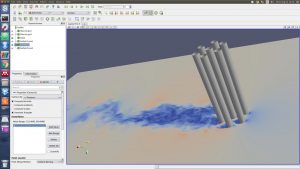At the Society of Maritime Industries (SMI) AGM Luncheon on the 6th October this year’s Donald Maxwell undergraduate award was presented to Kate Devereux who is just entering her 4th and final year of her MEng as a Ship Science student at the University of Southampton.
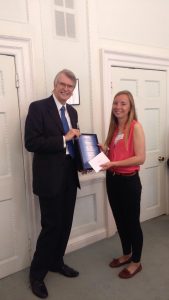
Kate received a cheque for £1,000 and her certificate from the Chairman of SMI Mr Peter French.
Mr French said: “Kate is a worthy recipient of this year’s award. Her dissertation is a fantastic example of the work young women are doing in our industry and SMI is proud to be part of celebrating British female engineers.”
The award is given for the best final year degree project from a UK resident student undertaking their study on a degree accredited by The Institute of Marine Engineering Science and Technology (IMarEST).
Judging was undertaken by SMI Board member Mr Duncan Cunningham FIMarEST and Mr Phil Green CEng FRINA. Kate’s paper most impressed the judges and was on the topic of “Investigation into the suitability of composite materials for the construction of marine propellers.”
The work was carried out following a summer internship at local propeller company CJR propellers working with FSI Alumni Dr Simon Lewis.
All posts by Stephen Turnock
Italian National Champions NACRA 17!!!
FSI PhD student Laura demonstrates that her understanding of hydrofoil is not just academic but also can be demonstrated out on the water where it counts. It has been a busy month or so with her recent award winning paper at the conference in South Africa Also reported by Landrover BAR where she has been working on a placement since last year. She reports on the Italian National Championships as follows
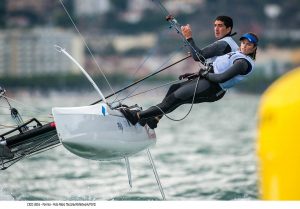
Last week my helm (Francesco Porro) and I (Laura Marimon Giovannetti) were in Formia racing for the Italian Championship title. The weather conditions were not the best, but we managed to get 5 races in in light wind conditions – 3 of which we won!
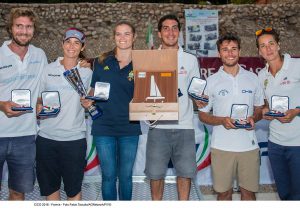
We sailed well throughout the week and managed to stay calm during the long waits for the wind. Our final scores were: 1-(3)-1-3-1!
The opponents were extremely strong and we managed to defeat the Italian representative in the Rio 2016 Olympics games (Bissaro and Sicouri) who came 5th at the Olympics! We are extremely happy with our performance and we look forward to go and trial the new foiling NACRA 17 at the end of October, in the hope that the NACRA class will decide the best boat for us to sail in the Olympic cycle toward Tokyo 2020.
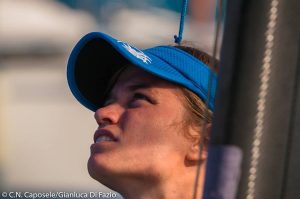
XPrize searches the oceans

Dr Nick Townsend in FSI is coordinating the University of Southampton team that is entering the Xprize for ocean exploration
More than two-thirds of our planet is covered by water yet we have only explored 5% of the ocean. This physically challenging environment prohibits today’s mapping technologies from exploring the ocean. The Shell Ocean Discovery XPRIZE will incentivize the innovation required to reach the scale, depth, speed and resolution necessary to illuminate the mysteries of the deep and discover what has remained unknown since the dawn of time.
The University of Southampton team is currently recruiting to our team whether you are a PhD student, member of staff, or a new starting undergraduate or foundation year student there will be a role for all.
Please contact Dr Townsend via his email to find out more!
Bridges visiting the City of Bridges
Dr Jon Downes and Artur Lidkte attended the first general assembly of Bringing together Research and Industry for the Development of Glider Enviromental Services – BRIDGES, which took place in Porto, Portugal.
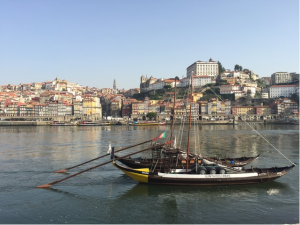
The Faculty of Engineering of the University of Porto, FEUP (http://lsts.pt/blog/bridges-1%C2%AA-general-assembly) – hosted the meeting on 6, 7 and 8 September 2016. This meeting aimed to evaluate the project status and share results and solutions between the different partners involved in the project.
BRIDGES is a consortium of 19 public and private partners from 7 European countries (SP, PT, UK, FR, NL, D, CY) and 2 from associated countries (NO, IS). The project is coordinated by ARMINES ENSTA-ParisTech

For more about the progress and news of BRIDGES please visit: www.bridges-h2020.eu
Gliding forwards
Dr Jon Downes was one of 150 delegates from across Europe that visited the NOC in Southampton for the 7th EGO conference on autonomous ocean gliders and their applications. The conference, hosted by the NOC, provided a forum in which scientists, engineers, students and industry exchanged knowledge and experiences on the development of glider technology, the application of gliders in oceanographic research and the role of gliders in ocean observing systems. Presentations included work from the EU H2020 Bridges Project developing the next generation gliders (http://www.bridges-h2020.eu/) that the University is contributing to.
Bridges visits the City of Bridges!
An EXCEL-lent summer
One of our summer placement student’s Aaron Page reports on his summer with FSI as part of the Maritime Robotics Lab. This was a paid internship the University of Southampton’s EXCEL scheme we will be advertising similar opportunities for next summer in the spring.
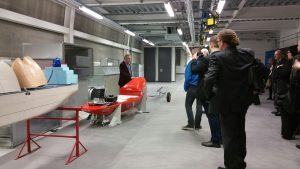
As a recently graduated electromechanical engineer from the University of Southampton, having the opportunity to spend two months at the highly regarded Bolderwood innovation campus with the FSI (Fluid Interactions Group) department was a fantastic opportunity to apply my studies to a real word engineering application. During my time I was working on a new control architecture for the Motors and Rudders on a previously student designed and built vessel called Fortitude this alongside further refitting will lead to long term deployments in the transatlantic and other areas for data gathering missions.
The project allowed me to apply my knowledge of control theory, whilst allowing me to further develop my skills as a programmer. I was given complete freedom to peruse the objective allowing me to approach it in the way I believed would yield the best results, this alongside regular weekly meetings with my supervisors ensured all options, and potential issues were highlighted and investigated. Various control methods were considered and how they could later be integrated with different autonomous control approaches and object avoidance algorithm’s, ensuring future steps in this multi-layered project are as smooth as possible. Being involved so early in this project has also given me the opportunity to identify problems that may be encountered later on in the projects life as well as make suggestions that may alter the direction of hardware selection.
Being invited to the weekly FSI seminar meetings where PhD students gave presentations on their research, furthered my knowledge of a field I had very little exposure to previously. This, alongside the summer events run by the staff and PhD students, has made my time with them very enjoyable.
This internship, run in partnership with the EXCEL scheme, has helped me developed a range of skills that I will now be applying as I start my PhD at the University of Southampton within ECS. I hope to remain involved with the project and look forward to seeing how it develops over the next couple of years.
The Route to Sustainable Shipping
A combined SMMI and FSI panel discussion
Wed 12th October 2016 at 18:00
University of Southampton, Boldrewood Campus, 1125/176L
FSI post grad student Josh Taylor has organised a panel discussion as part of Southampton Sustainability Week.
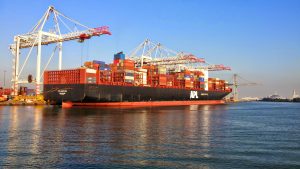
This public event explores the challenges faced by the maritime industry on the route to becoming more sustainable. The unique framework of the Southampton Marine and Maritime Institute facilitates the continued exchange of ideas between people in both academia and industry.
This event is part of Southampton’s first annual sustainability week and should provide a stimulating discussion to create opportunities for change while showcasing the maritime industry’s presence in Southampton. Southampton sustainability week is a series of city-wide events which encourage sustainable behaviour change by increasing awareness of issues and celebrating progress to date. The week is organised by a group of volunteers and headed by the founder Jenny Barnes.
A distinguished panel of industry experts and academics will discuss the challenges the maritime industry faces in achieving environmental sustainability, guided by structured questions from the chair, Professor Ajit Shenoi, University of Southampton director of the SMMI. The discussion topics will include Ship design, Maritime law, Regulation and innovation, Fleet operation, Waste management.
For those interested in attending please register for free via Eventbright:
https://www.eventbrite.co.uk/e/the-route-to-sustainable-shipping-tickets-28168759518
If you are interested in exploring our study opportunities in maritime engineering and ship science then the video interviews with two of our graduates Thomas and Emily from graduation this summer maybe useful.
Lets twist – how does it influence VIV?
This summer one of our recent MEng graduates Carlos Losada de la Lastra spent a month in Southampton and two in Singapore and reports on his research project in offshore hydrodynamics.
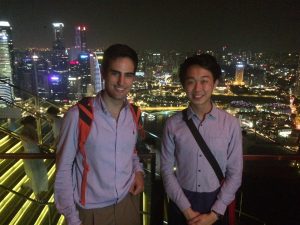
The offshore industry is tending towards multi-riser structures where the offshore platform or floating unit uses more than one pipe to meet more requirements. These pipes have a cylindrical cross section, which may induce vortex induced vibrations (VIV) as crossflow passes around them. This causes fatigue and high loading on the connection points at the seabed and the offshore structure.
The aim of the study was to investigate whether a helical arrangement of the cylinders could reduce the vibrations of the array and provide a wider operational window for offshore structures with multiple risers. I carried out the study using Assoc. Prof. Weymouth’s CFD solver, Lotus, to predict the flow around a seven cylinder array. The main parameters affecting the VIV of the array are, the flow speed, the gap between the cylinders, and the pitch of the array. Where the pitch governs the helicity of the array. To decouple each of the parameters I carried out separate investigations covering each of the parameters.
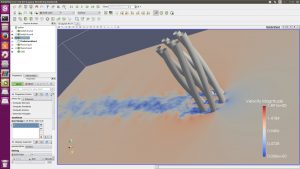
I started the parameter investigation by looking into the effects the gap had on the side force produced by the vortex shedding. I then started investigating the effects of varying the flow speed on the gap range of relevance. Before running simulations of the helical array I had to write a mapping function that twisted it. Having finished writing and validating the mapping function, I looked into the effects of varying the pitch of the array.
The project has been a really good experience. The idea of a helical array came from a question I asked during a lecture last January. This really motivated me throughout the project. The project itself provided a great insight to research. My two supervisors, Assoc Prof. Weymouth and Dr. Vinh Tan, provided invaluable guidance and help throughout the project, but it was up to me to run the simulations, deliver good results and contribute to the discussion. This allowed me both to develop and organise, my simulations, my thought process and my reasoning through the concepts. I learned a lot about hydrodynamics, running and automating simulations, and post processing of results. I also improved my programming and computing skills.
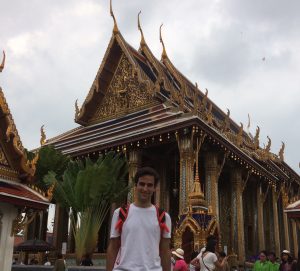
On the cultural side of things I managed to see and experience Singapore with many friends, and squeeze a trip to Bangkok on a weekend as a back packer.
UK Fluids Conference 2016
On the second week of September, the first Fluids UK Conference took place at the Imperial College in London. Several researchers across the UK and overseas gathered together to share their investigations in a very wide range of disciplines across fluid dynamics. A large number of researchers from the Aerodynamics and Flight Mechanics (AFM) and the Fluid-Structure Interactions (FSI) groups of the University of Southampton were also present in the event.
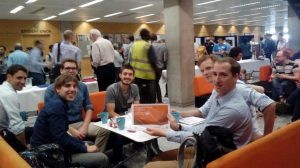
I am Bernat Font Garcia a first year PhD student and I recently attended my first conference as a speaker. I was part of a big group coming from the University of Southampton, one of the universities which brought more researchers into the event.
A total of 96 presentations were delivered during the three days of the conference. Presenters were either PhD students or post-docs, mostly. Each presenter had 10 minutes to explain the topic and 2 minutes were scheduled for questions. It was a challenging exercise to condense one year of work into such a short amount of time, although I can image this was even more difficult for students in the last year of the doctorate or post-docs researchers!
The topic of my presentation was: “A two-dimensional model for three-dimensional symmetric flows”. Using the well-known backward-facing step test case, the aim is to obtain the steady solution of the three-dimensional case at the symmetry plane using a two-dimensional model. Hence, instead of carrying a three-dimensional simulation, the solution is achieved by the two-dimensional Navier-Stokes equations plus additional terms. The main outcome of this work is the notable reduction of the computational time required to achieve the three-dimensional solution for symmetric or spatially-periodic flows.

Overall, it was very inspiring to get to know what topics are currently being investigated in fluid dynamics and to meet people working within this field. Also, it was the perfect opportunity to communicate my work and conclude the first year of my doctorate.
Trip to the Cape – passive adaptive foils for high performance yachts
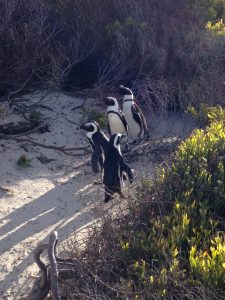
Recently Laura Marimon Giovannetti, a final year PhD student in FSI currently completing a 10 month placement at Ben Ainslie Racing attended the Sixth International Conference on Structural Engineering, Mechanics and Computation (SEMC 2016) in Cape Town, South Africa and reports below. We offer our congratulations to her on winning the best paper in the young researchers award category. She reports on some of the key parts of the conference.
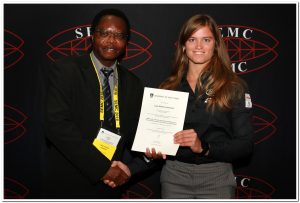
The conference featured 360 papers with authors representing 60 countries from all five continents. With a great number of fields of structural mechanics and a large number of papers, the competition for the best paper in the Young Researchers Award (under 35) was hard, but I managed to bring the award home. I was presented to the opening ceremony as the winner of the prize and I had the possibility to present my research in the largest room! I was very pleased with the compliment received for my paper by the conference organizer Prof. A. Zingoni of the University of Cape Town. Following my presentation I had some interesting questions and all the people in the room were pleased with my work on passive adaptive composite foil design based on coupled FSI using StarCCM+ and based on our validation studies in the R.J.Mitchell wind tunnel using synchronised PIV and DIC.
The topics of the conference were very broad, from fluid-structure interaction to soil-structures interaction (for earthquake damage-prevention) to composites and sandwich materials. Within the three days of the conference we had six parallel sessions running all day.
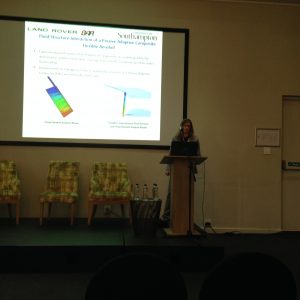
Keynote speakers were Prof. Kim Rasmussen (University of Sydney, Australia), Prof. Adnan Ibrahimbegovic (Universite Technologie Compiegne, France), Prof. Klaus-Jürgen Bathe (MIT, USA), Prof. Amr Elnashai (Pennsylvania State University, USA), Prof. Jian-Fei Chen (Queen’s University of Belfast, UK) and Prof. Guido De Roeck (KU Leuven, Belgium). All the keynotes were focusing on different aspects of structural mechanics and the ones that I liked the most were the one from Prof. Jian-Fei Chen and the one from Prof. Amr Elnashai.
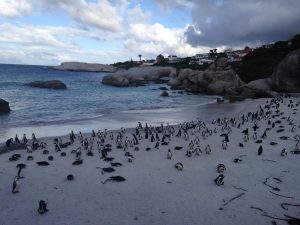
I have also met a large number of new people (from fellow PhD students to professors) and I had the opportunity to go with some new friends (PhD students at Ferrari) to visit Cape of Good Hope and the African penguins in Simon’s town.
I’d like to thank both the University of Southampton and Land Rover Ben Ainslie Racing for allowing me to attend this extremely interesting conference. I also would like to encourage people to travel to Cape Town, the city and its surroundings are beautiful and you can learn a lot about the history of the country visiting the Apartheid prison in Robben Island, where Mandela was held prisoner for 17 years.

